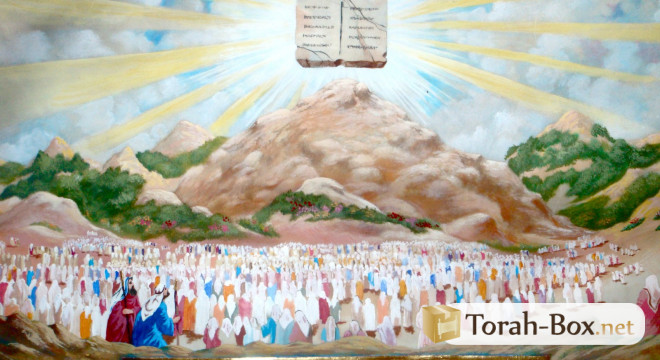
Mussar
Sinai Revelation: Words Versus Images, A Frontal Shock
"For you did not see any image on the day that God spoke to you on mount Horeb amid the flames” (Devarim 4,15). So, the gift of the Torah on Mount Sinai is defined as an image-less occurrence, a “non-televised” event.. Anyone who wants to describe Judaism in images will come up against an unavoidable reality: "You have not seen any images".
This drastic distance from images, this total absence of divine representation is the cornerstone of Jewish civilization. It draws its source from Sinai (Devarim 27: 9). "On that day you became a People" (Devarim 27: 9). One can speak of the Jewish nation only after the gift of the Torah on Mount Sinai. On this unique day in the annals of the history of humanity, the Jewish people received its Constitution. As Rabbenou Saadia Gaon puts it: "Our Nation is a nation through and because of its Torah". And our Constitution comes with a warning: "For you have seen no image".
Simply put, the civilization that was birthed on that day is the civilization of the Word, the People of the Ten Commandments. This civilization laid the foundation of faith in a unique God. A God that exists beyond all material contingencies and all pictorial representations. Thus, henceforth, the path of idolatry is barred, a path bordered by idols, images and icons, which are but expressions of human minuteness facing the immeasurable mystery of the Absolute.
Word against image is the expression of a terrible and shocking truth, whose opponent is the lie. An image is fixed, remissive, motionless; speech represents movement, interpretation and freedom. And within this liberating word, we also find a fracture, almost as divisive as the fracture between image and speech. There are fixed words and there is free speech. The immutable word for eternity is the written Torah, which Peoples have named the “Bible” by encapsulating it in the diminishing framework of Greek wisdom, in its Greek translation, known as the Septuagint, representing an echo of the original.
King Ptolemy II of Egypt, who succeeded his father, Ptolemy the First, was one of Alexander the Great’s generals, who conquered Egypt from the hand of the Persians. Ptolemy ordered a translation of the Torah into Greek. He summoned seventy Jewish Sages, whom he locked in separate rooms to keep them from consulting one another. Miraculously, they all translated the Torah word for word, thus demonstrating that they were all divinely inspired. This is reported in the Treaty of Megillah page 9a and 9b). The Oral Torah is an aspect of the Bible symbolizing the “free word”, which continues to be transmitted from one generation to the next, and continuously being developed and adapted. Paradoxically, it also has been written down. The Oral Torah is infinite, as the "image" of the One who gave it to us .
The Oral Torah remained exclusively safeguarded by the Jewish people when they became free from Egyptian bondage and forever liberated. The written Torah was reclaimed by other Peoples, who sought to translate it into images. This "betrayal" of the Torah in images, such as "The Illustrated Bible", as well as numerous Bible-themed Hollywood scripts, such as the most famous film: "The Ten Commandments" diminished and vulgarized the Torah’s message.
In this era of images, the Jewish people must teach humanity an invaluable lesson: man may access freedom only through the Word, as it was first revealed and then analyzed and clarified to unravel its ultimate truth. Television, cinema and internet, all vectors enhancing the image civilization, risk becoming avenues for the enslavement of man, rather than for his liberation. Man’s freedom is thus jeopardized and in danger of succumbing to modern iconolatry.
Whoever wants to be free and discover evidence of the infinite in the finite, has only one way to go: study the divine word, the Oral Law. Study, discover and set your studies and thoughts in motion so you may know Him. His Word is the very source of Truth and therefore of Freedom. The Pirkei Avot continues: "There is no freer man than one who studies the Torah" (Pirkei Avot, chapter 6, michna 2). This means that only deepened study of the Torah can free man from the grip of his instincts and allow him access to genuine freedom, resulting in mastering his character, according to the measure in which he stands in the service of Hashem. This paradox actually means that if man does not serve God, he will be the toyed with by negative forces.
So the intense and deepened study of the Torah is a privileged path to facilitate man’s quest for truth and freedom ...
Torah-Box.net Account
To access the entire Torah-Box.net website, sign up for free in less than a minute.
Weekly Parsha
 Candle Lighting - New York
Candle Lighting - New York
Friday March 6th, 2026 at 17:34 *Shabbat ends at 18:35 *
change my location
* Times given as an indication, check the times of your community











